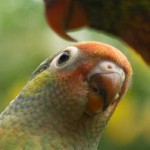Customs media release
Parrot eggs smuggler to be deported – Thursday, 3rd April 2008
A 46-year-old Dutch national, who was arrested and charged by Customs when he attempted to smuggle exotic birds’ eggs into Australia, was today ordered to be deported after serving time in jail since his arrest last year.
Customs National Manager Investigations Richard Janeczko said, “Smuggling of wildlife including birds’ eggs into and out of Australia is big business to some people but it poses a real threat to the global environment and puts profits before the welfare of the animals and the future of endangered species.”
Antonius Duindam had pleaded guilty in Sydney’s Downing Centre District Court to illegally importing 10 West African parrot eggs last November.
In sentencing Mr Duindam, the judge handed down a jail term of four months and 25 days, which he has already served, and his immediate deportation.
Customs officers at Sydney Airport discovered the eggs concealed in a purpose-made body vest when they searched Mr Duindam who had travelled from the Netherlands via Hong Kong.
He was arrested by Customs investigators and has remained in custody until his sentencing today.
Mr Janeczko said the sentence reflected the seriousness of wildlife smuggling.
“Australia has some of the strongest wildlife protection laws in the world. Under the Environment Protection and Biodiversity Conservation Act 1999, the export and import of wildlife products is strictly controlled and policed.
“The smuggling of birds’ eggs into Australia is also a concern for health reasons as they pose a high quarantine risk with the real possibility of introducing diseases into the environment,” he said.
Media inquiries:
Customs Media 02 6275 6793







